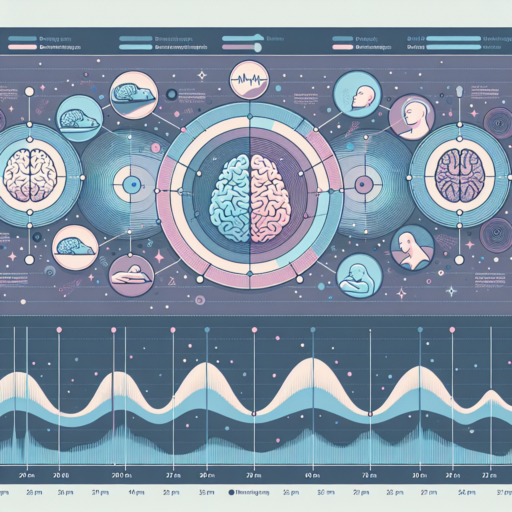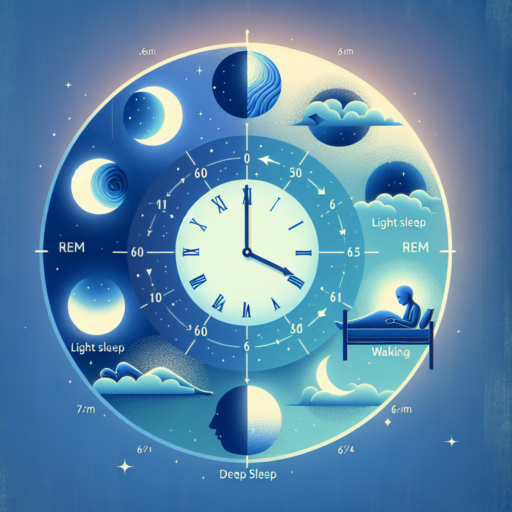What are the 5 stages of sleep?
Understanding the 5 stages of sleep is crucial for grasping how sleep works and its impact on our health. Spanning from light to deep sleep, and finally to REM sleep, each stage plays a vital role in our physical and mental rejuvenation.
Stage 1: Light Sleep
The journey into the night’s rest begins with Stage 1, characterized by light sleep. Here, the body starts to relax, and brain wave activity begins to slow down. This stage acts as a transition period between wakefulness and sleep, typically lasting for several minutes.
Stage 2: Onset of Sleep
Progressing to Stage 2, sleep gets deeper. This is marked by a further decrease in heart rate and body temperature. During this stage, the brain produces sudden increases in brain wave frequency known as sleep spindles. Stage 2 serves as a preparatory phase for deep sleep, crucial for feeling refreshed the next day.
Stages 3 & 4: Deep Sleep
The third and fourth stages are collectively known as deep sleep. It’s during these stages that the body undergoes significant repair and growth, thanks to the release of growth hormones. Deep sleep is critical for memory consolidation, cognitive function, and energy restoration.
As we move through these stages of sleep, our bodies and minds undergo important recovery processes. Understanding these stages can be the first step towards improving sleep quality and, by extension, overall health.
No se han encontrado productos.
What happens in stage 4 of sleep?
Stage 4 of sleep, often referred to as the deep sleep or delta sleep phase, is critical for the restorative functions of sleep. During this stage, the body undergoes significant rejuvenation and repair processes. The brain waves slow down dramatically, entering into what are known as delta waves, which are the deepest form of sleep waves. This phase is paramount for the body’s recovery and the bolstering of the immune system.
In terms of physical health, stage 4 of sleep plays a crucial role in the repair and growth of tissues, strengthening of the immune system, and replenishing the energy stores depleted during the day. It’s during this period that the secretion of essential growth hormones peaks, facilitating the repair and growth of muscle and bone tissue, as well as the overall rejuvenation of the body.
Mentally, this phase is just as important. It assists in memory consolidation, the process by which short-term memories are converted into long-term memories. This is integral to learning and the acquisition of new skills. Without spending adequate time in stage 4 sleep, individuals might find it harder to remember information or learn new tasks efficiently.
How much deep and REM sleep do you need?
Understanding the necessary amount of deep and REM sleep is crucial for optimizing health and wellness. Both stages of sleep serve unique and vital functions in our body’s rest and recovery processes. While the exact amount can vary by individual, some general guidelines can help you ensure you’re getting the restorative sleep your body needs.
Deep sleep, also known as slow-wave sleep, is the period during which your body undergoes most of its physical restoration. For most adults, aiming for at least one to two hours of deep sleep per night is considered beneficial. This stage helps with muscle growth, tissue repair, and immune system strengthening. On the other hand, REM (Rapid Eye Movement) sleep, which accounts for about 20-25% of an adult’s sleep cycle, is crucial for mental restoration, memory consolidation, and mood regulation.
Optimal Sleep Ratios
- Deep Sleep: Aim for 1-2 hours
- REM Sleep: Approximately 20-25% of total sleep time
Adjusting your sleep environment and habits can significantly impact your ability to reach these optimal sleep ratios. Ensuring a dark, cool, and quiet sleeping environment and maintaining a consistent sleep schedule are foundational steps to enhance the quality of both deep and REM sleep stages. Listening to your body’s needs, however, remains the most important aspect of achieving the ideal balance between these critical phases of sleep.
What is the best sleep stage?
Understanding the various stages of sleep is crucial for recognizing the best sleep stage for overall health and well-being. Sleep is composed of multiple cycles, each featuring distinct stages that play unique roles in physical and mental restoration. Among these, one stage often receives particular attention for its profound restorative benefits.
The Importance of REM Sleep
While each sleep stage serves a purpose, Rapid Eye Movement (REM) sleep is frequently championed as the most beneficial for cognitive functions and emotional health. During REM sleep, the brain is almost as active as when awake, fostering processes essential for learning, memory consolidation, and mood regulation. This stage is often considered pivotal for mental restoration and creativity.
The Role of Deep Sleep
Similarly, deep sleep, or NREM Stage 3, is fundamental for physical health. It’s a period of slower brain waves, reduced heart rate, and relaxed muscles, which contributes significantly to tissue growth, repair, and overall energy restoration. This stage is especially crucial for immune system strengthening and physical recovery.
In summary, determining the best sleep stage depends on the aspect of health one considers most vital. Both REM and deep sleep stages offer indispensable benefits, making them essential components of a good night’s rest. Understanding the functions and importance of these stages can help optimize sleep quality for better health outcomes.




